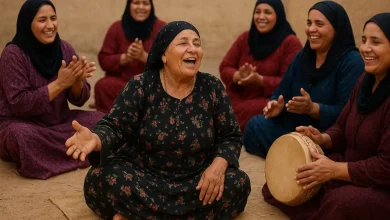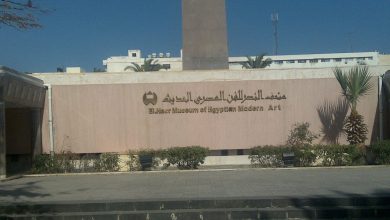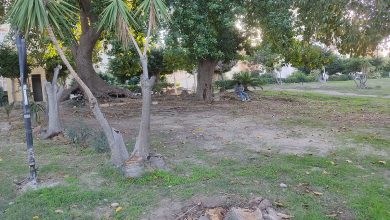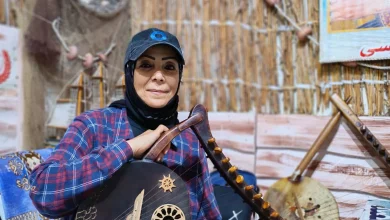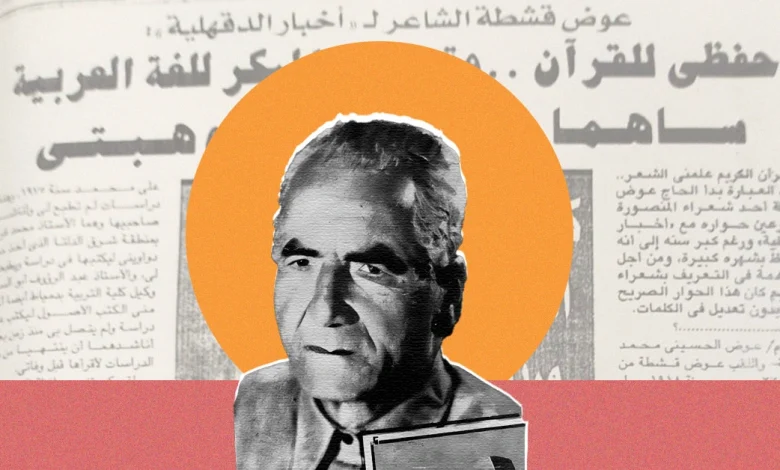
From groceries to poetry: The story of Awad Qishta, the forgotten poet of Dakahlia
“To you, shining from your tower in the distance, giving and not taking, like all great ones… O poet of Egypt, buried in a world of falsehood, beneath the rubble of oppression… I salute you as you struggle to live, forgetting the bitterness of life in moments of creativity. And to you there… where you live in the shadows, shining the spotlight on others.
Awad! O poet of Egypt!
One day, literary history in Egypt will awaken and regret every moment it did not appreciate you. Your poems, your verses, and your approach to life will become a playground for scholars and seekers of literary pleasure. You will die, yes, but the poet Awad will not die. You will remain in the conscience of this nation as a piece of its joy, its feelings, and its great pain.
Until we meet, and we may not meet, I salute you.
Salah Hafez.
A precious treasure in an old library
One day in the summer of 2020, my friend Abdul Rahman Qishta came to me and asked me to help him move the furniture from his parents’ old apartment to their current home. While we were there, my attention was drawn to his parents’ library, which my friend quickly began to talk about as soon as he noticed my interest in it.
It was an antique library, containing a huge number of books, stacked on top of each other and covered with a layer of dust. We struggled to discover and examine them one by one, but our curiosity and our preoccupation with the contents of the library—books, papers, memoirs, newspapers, magazines, and photographs—made our efforts easier.
While doing so, I accidentally knocked over some papers that were on one of the library shelves, scattering them on the floor. I reached out to gather them up, and my gaze was drawn to what was written on them and the way it was written, two columns with a space between them. I brought the paper closer to my eyes and dusted it off, and found handwritten poetry. The beautiful, clear handwriting prompted me to read it, and the paper I had picked up was the first poem.
***
I always wish for my life to be long
What remains for us of the happiest times?
In vain I lull it, and deny myself!
I mourn poetry before my death
But if fate decrees it, what
Those feelings may lead to others
We gathered the papers together and tried to arrange them to find their author. During this process, my friend told me that his grandfather, Awad Qishta, was a poet, and that his father had kept his poems since he was a small child, so it was not difficult to identify the owner of these papers. After some research, we both realized that we had stumbled upon a precious treasure that had been hidden from us behind the bookcase: a collection of papers, bound together between the covers of an old book, with the words “My dear… Peace be upon you and God’s mercy and blessings. These papers are entrusted to you… etc.”
It was a will written by our poet to his nephew, Ahmed Tawfiq Qishta, the father of my friend Abdul Rahman, instructing him to read it, keep it, and publish what could be published from it.
That was the first time I heard about our poet, who seemed to me at the time to be perhaps not well known because his poetry was not very good, and because the old custom was that the neighborhood minstrel did not entertain or delight. The years passed quickly, and fate brought that poet back into my life, but in a deeper, more conscious, and more balanced way, so that I could follow the man’s biography and his poetry.
“I want to carry out the will.”
During a nighttime gathering at one of the town’s cafes, “Tami al-Amid,” I was with my friend Abdul Rahman. We talked about this and that, until we mentioned our grandfather Awad, and I reminded him of the papers we had found five years or more ago. I asked him where they were and why he didn’t show them and publish what was suitable for publication.
He paused for a moment, then sighed and said: “Do you remember the will that my grandfather Awad wrote to my father? Don’t you remember that he instructed him to publish what could be published? My father, may God have mercy on him, died without carrying out the will, and perhaps I am now responsible for carrying it out!
One night, he asked to see me, so I met with him and found him carrying an old, worn-out file. He handed it to me, saying, “Here is what my grandfather left to my father. Perhaps you will be able to publish it one day. Make sure you do, because I want to carry out the will. I think that day has come.”
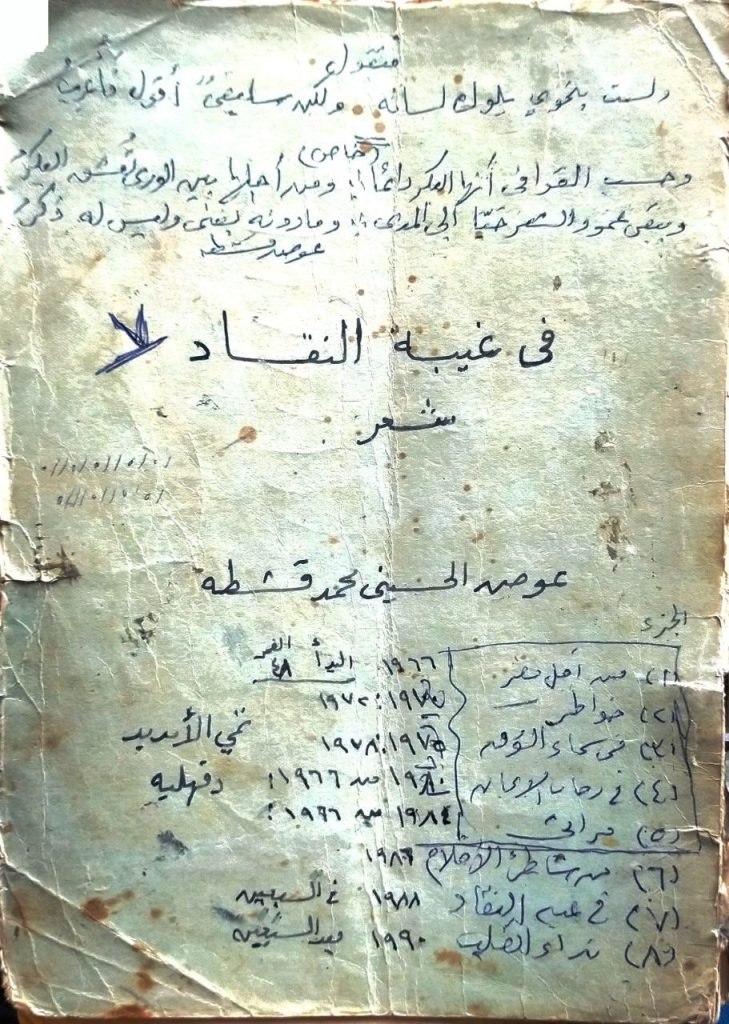
Primary education and grocery shopping
Hajj Awad was born on September 22, 1918, in the village of Tami al-Amdeed, in the district of Sinbillawin, in the governorate of Dakahlia. He grew up there and memorized the Qur’an at a young age in the village school. He enrolled in primary school in 1924 and studied there for five years until he received his certificate.
In another world, Awad could have continued his education, but his living conditions did not allow him to do so. This was his luck in terms of formal education, and it was natural for him to work as a grocer in his father’s shop in the village. He remained in this profession throughout his life, so much so that some old newspapers published an article entitled: “The Story of Uncle Awad the Grocer” and another entitled “The Poet Grocer.”
Despite his work as a grocer, he retained a deep love for Arabic literature and poetry, and a burning passion that drove him to read and memorize poetry incessantly. In an interview with Ashraf Abd al-Samie (published in the newspaper Akhbar al-Dakahlia, a clipping of which remains in the file I took from my friend), Hajj Awad said: “I read and memorized the works of Ahmad Shawqi, Hafiz Ibrahim, Ali al-Jarim, Hashim al-Rifai, Ali Mahmoud Taha, …”.
Between grocery shopping and literature
Hajj Awad remained in this state, reading books and following the most famous literary magazines and newspapers of his time. He was even keen to attend cultural seminars and contact writers and professors for the slightest occasion or event. His son, Hajj Jamal Awad Qishta, told me that he accompanied his father on more than one occasion to meet Dr. Muhammad Hussein Heikal.
I found a clipping from an old newspaper in the file that confirms this, stating that he met Dr. Heikal in 1936. That meeting was a great motivation for him to read and learn, to the extent that he would walk on foot from his village to the city of Senbalawein just to get some books from one of the libraries there. The reader may not realize the extent of his suffering if he does not know that the distance in question exceeded twenty kilometers.
Meeting Aisha Bint Al-Shati
His son also told me that his father was always in contact with the great scholars whenever he could, and he told me the story of his meeting with Aisha Abdul Rahman, Bint Al-Shati. He then told me about his close relationship with the great scholar Dr. Muhammad Abd al-Moneim Khafagi, author of Al-Azhar in a Thousand Years and many other books and major investigations.
I was not surprised by this, because Professor Khafagi is my fellow countryman, Hajj Awad. He is from the village of Talbana, a few kilometers from Tami al-Amid. This was confirmed when I found a copy of Hajj Awad’s collection of poems, Ma’a al-Ayyam (With the Days), which his son Jamal had given me. This copy included a foreword to the collection written by Professor Khafagi himself.
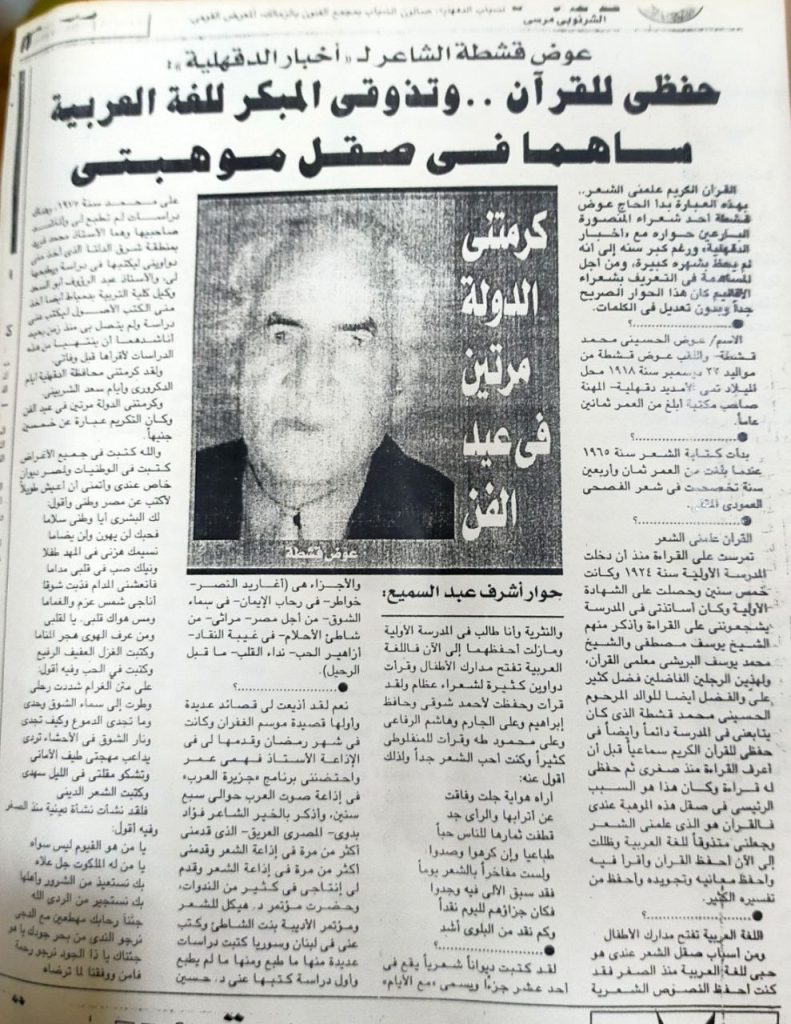
A poet at fifty?!
Uncle Awad had no artistic writing activities, although he may have made some attempts in letters to friends or to the writers he frequented. We have always heard that the signs of talent appear in childhood, and that the prodigies of the age had signs of genius shining above their heads, but we are not used to hearing of a man who has lived fifty years and then suddenly produces poetry of such quality, attested to by leading professors and writers as brilliant and creative!
In an interview with Hazem Nasr (the article is excerpted without mentioning the name of the newspaper), Hajj Awad says: “It never crossed my mind that one day I would write a single line of poetry, despite my love of reading and poetry since childhood. I read Zuhair bin Abi Salma, Al-Farazdaq, Al-Ma’ari, Imam Al-Shafi’i, and Al-Busiri. Then I read Al-Baroudi, Al-Jarim, Shawqi, and Hafiz, but even so, it never occurred to me to write poetry. How could it? I don’t know any Arabic grammar or rhetoric rules. I don’t know anything about poetic meters, their nature, or their relationship to poetry and its expression.
In 1967 (when he was about 50 years old), I came across a collection of poems by the martyr Hashim al-Rifai. I read it and memorized much of it, contemplated its structure, and internalized it all in my conscience, heart, and senses. I had barely finished this collection when poetry began to pursue me every minute of every day, night and day. poetry came to me every minute of every day, night and day…”.
His poetry from newspapers to faculties of arts
It is impossible to imagine the extent of the suffering that Uncle Awad endured during his first attempts to publish his poetry. Who would consider the initial poetic attempts of a man in his fifties, let alone publish them in newspapers!
He suffered greatly, but he was patient and persistent, tireless and relentless, writing whatever his imagination produced, then sending it to newspapers and magazines. Many newspapers published his work, including Al-Gomhuria, Tujar Al-Dakahlia, Akhbar Al-Adab, and others. Years passed.Then, as soon as his poetry was published and came to light, he was inundated with requests from researchers in faculties of literature, asking him to provide them with his poetry for study. Hazem Nasr mentions in his aforementioned article:
“Scholars sought him out, and he became a fertile ground for their literary studies, with 16 literary and critical studies written about him. He became one of the figures studied by final-year students at the faculties of education in Mansoura and Damietta in the subject of modern literature.”
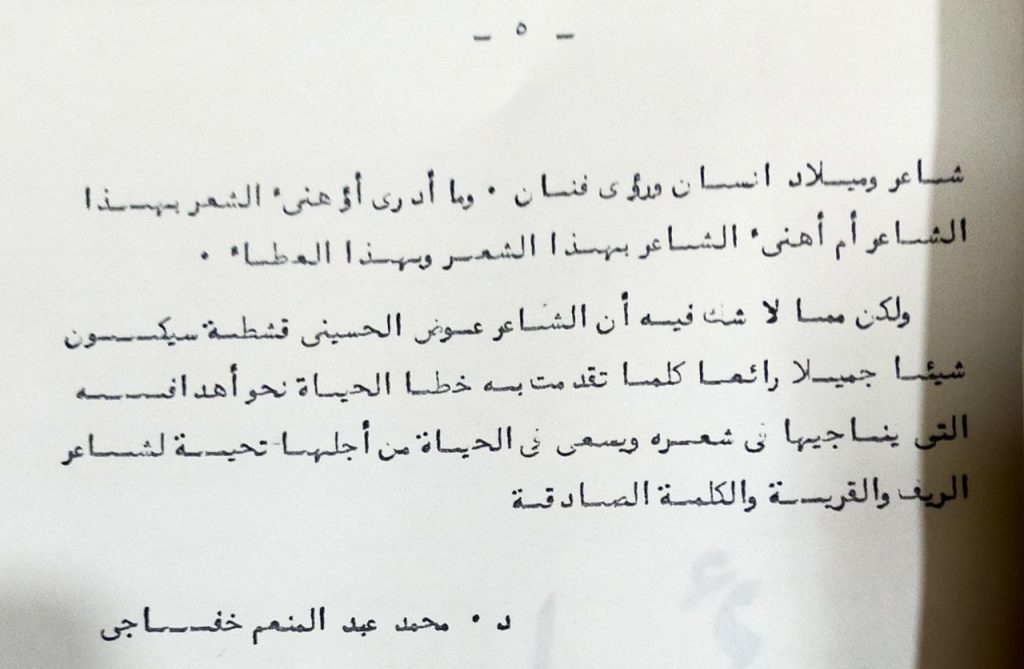
The first study on Al-Hajj Awad
The first study written about Uncle Awad was written by Dr. Hussein Ali Muhammad in 1975, entitled: (Awad Qishta… His Life and Poetry). According to what he himself mentioned in his interview with Akhbar Al-Dakahlia newspaper, he said that much of his poetry was broadcast on radio programs. Professor Fahmi Omar presented it on the program Jazira Al-Arab (Arab Island) on Sawt Al-Arab radio. Egyptian poet Fouad Badawi presented it many times on “Radio Poetry.”
The Dakahlia Governorate honored him more than once, as did the state, with an honorarium of fifty pounds, according to what he mentioned. All of this indicates to the reader that our poet has established his presence in the literary and cultural scene, not only in the Dakahlia Governorate, but also in the Republic of Egypt, especially in Cairo, the capital of literature, culture, and art in the entire Arab world.
Perhaps the reader has not forgotten the words with which we began this article, which are but an excerpt from a long letter of friendship written by Salah Hafez, the great journalist and writer, and former editor-in-chief of Rose al-Youssef (who died in 1982). In it, he expresses his sincere feelings about one of the poets of his time. It was this poet’s work that prompted him to reconsider his view of classical poetry. He himself mentions this in the letter I found among the papers in my possession.
The poet’s wish and his will
Finally: Uncle Awad Qishta was a talented poet with an innate gift. He found his way into the light, into the world of literature and culture, after reaching the age of fifty. His poetry was refined and polished by the experiences he had gone through. Our uncle Awad was keen to publish his poetry, broadcast his words, and bring them to light. He did everything he could to spread his words as far as possible. Despite this, he suffered a lifetime of neglect. He was no longer mentioned in literary and cultural circles, except in a small, limited circle.
His will was for his nephew (the father of my friend Abdul Rahman) to publish the papers he had left him, in the hope that someone would take up his poetry, follow in his footsteps, collect his works, read them, and present them to readers. Perhaps we have revived his memory once again and presented him to readers and researchers anew.

